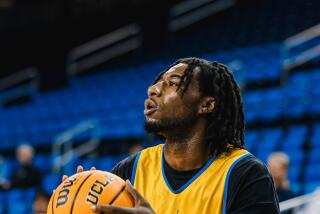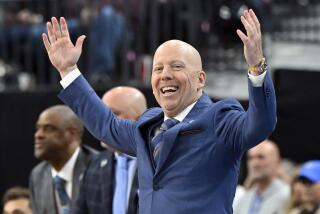A Big Win for UCLA’s Little Pro
In the year of Our Lord, 1988, Los Angeles sports teams won several national championships. Can you name some of them?
The first two are easy: The Dodgers won the World Series, and the Lakers won the NBA title. The rest were won by UCLA teams, and to get the one I have in mind, you may have to buy a vowel.
I’ll give you a hint: It was not the football team. Those guys didn’t even get to the Rose Bowl. The basketball team? Never even made the Final Four.
Give up? It was the golf team. For the first time in history, a team from Southern California won the National Collegiate Athletic Assn. golf championship.
Now, lest you think that a piddling accomplishment, be advised that the NCAA golf tournament may very well be the fifth-most important golf tournament in the world today.
Look at it this way: There are, by common consent, five majors in the world of golf. The big four are the U.S. and British Opens, the Masters and the PGA, although some would argue that the Players Championship has replaced the PGA. Anyway, when you count up Jack Nicklaus’ record of 20 majors, two of them are U.S. Amateur championships. When you compute Bobby Jones’ 13 major championships, four of them are U.S. Amateurs.
Any golf expert in the country will tell you the NCAA is a far more important tournament today than the U.S. Amateur. It is an incubator of champions. You want to see who will be the contenders in the 1995 Open? Check the field in the 1990 NCAA.
Look at the winners over the most recent decades: Nicklaus, Curtis Strange, Ben Crenshaw, Tom Kite, Scott Simpson, Bob Murphy, Hale Irwin, John Mahaffey. The chances are good that the next Arnold Palmer played in the NCAA in Oklahoma last month. The real Arnold Palmer once finished second in this tournament.
A good investigative rule of procedure when you find a team excelling in any sport is to go find the coach. After all, what would Notre Dame have been without Rockne, the Packers without Lombardi, the Bruins without Wooden, the 49ers without Walsh?
Eddie Merrins doesn’t look like a fire-breathing coach. Nobody would ever think of calling him Bear or even, for that matter, Skipper. He talks just loud enough so you can hear him in a quiet room.
He’s never shouted in his life. No one’s ever seen him lose his temper. He’s as quiet and patient as a monk. He’s not the type of guy to snarl, “Now, go out there and stopmaking bogeys!” Eddie’s style would be to say quietly, “Would it do you some good to move your right hand over on the shaft just a little?”
He’s been the coach of UCLA’s golf team since 1975. Not even full-time, mind you. In his full-time job, he’s head professional at Bel-Air Country Club, one of the more posh L.A. golf tracks where most of Hollywood, from Howard Hughes to Howard Keel, played or still plays its golf.
Most people expected Eddie to just throw open the course periodically to the collegians, help them a little bit with their putting and tell them to try and keep it in the fairway.
Not Eddie’s style. Eddie’s been a guy who always goes for the pin in whatever he does. So he started off by staging mammoth fund raisers for college golf generally--not only UCLA--in which the prize list would range from two weeks in Tahiti to a year’s use of a limousine. Those attending the banquets would range from Arnold Palmer to Peter Ueberroth to Lee Trevino to Byron Nelson to Greg Norman.
Eddie Merrins had been at Bel-Air since 1962 and no one ever refers to him by name. He is the Little Pro, as in, “Has anybody around here seen the Little Pro?”
The Little Pro is 5-feet-7 (in spikes), he may weigh 150 (after lunch) and, with those dimensions, had never been able to bust the ball out there with the big guys in the game. Not that he ever stopped trying.
Eddie played in eight U.S. Opens, six PGAs, 16 L.A. Opens and 17 Crosbys. He didn’t win any of them. He always had a club job on the side and the last time a club pro won any of those tournaments, shafts were hickory and five-irons were called cleeks.
Eddie had won the national Jaycee juniors in 1950--he beat Gay Brewer, no less, in the final--and he once beat Byron Nelson and Sam Snead in Mississippi, when he was still a junior player.
But mostly he taught. Pro golf was not the big rock candy mountain it was to become. You couldn’t make $5,000 just making the cut in the ‘50s. You had to finish in the top 10 every week or go back to cleaning clubs and giving lessons to stockbrokers and television magnates.
Eddie got to be one of the best at it--at Merion in Philadelphia and Westchester in New York. There wasn’t a swing he couldn’t fix.
If there’s one thing he could do, it was recognize a good swing, a promising player. He scoured the junior tournaments for prospects.
Most of the schools with golf programs, Houston--which has won 16 NCAA titles--Notre Dame, Oklahoma State, even Stanford, had full-time, fully employed golf coaches. Eddie did it for nothing and in his spare time. It was like Bear Bryant having to teach chemistry.
But he soon had the program in high gear. He had the likes of Corey Pavin, Duffy Waldorf and Steve Pate hitting balls for him, and winning tournaments. He very nearly got Bobby Clampett, John Cook and Fred Couples.
When his Bruins won the tournament at North Ranch in June of ‘88, it was the first time a West Coast school had won it since 1953, when Stanford did it. Until then, Stanford, which did it six times, and San Jose State were the only West Coast schools ever to have won it.
Eddie didn’t get any ticker-tape parades or ceremonies on City Hall steps for bringing the NCAA championship to L.A. He didn’t have his agent negotiate for a million-dollar raise. Eddie didn’t even get a school letter. In fact, Eddie has found that the demands of the job are such that he had to retire the other day and devote full time to his job at Bel-Air.
But when you talk of the mentors who brought national titles to L.A., Howard Jones, Red Sanders, John Wooden, Pat Riley, Walter Alston and Tommy Lasorda, don’t forget the Little Pro--who did it so quietly and unobtrusively, no one even noticed.
All of a sudden, he was standing there saying softly to the rest of college golf, “You’re away!”
More to Read
Go beyond the scoreboard
Get the latest on L.A.'s teams in the daily Sports Report newsletter.
You may occasionally receive promotional content from the Los Angeles Times.










